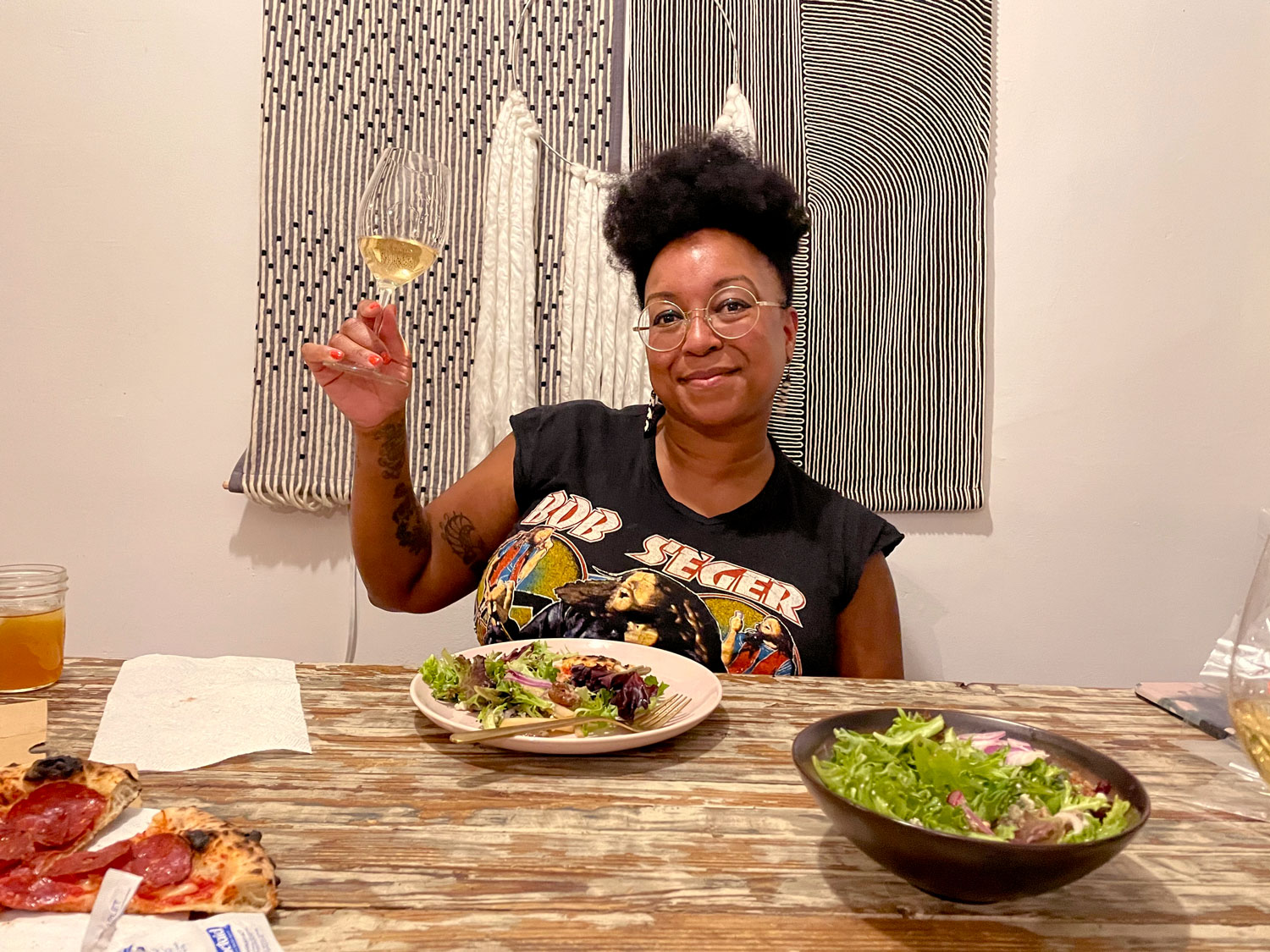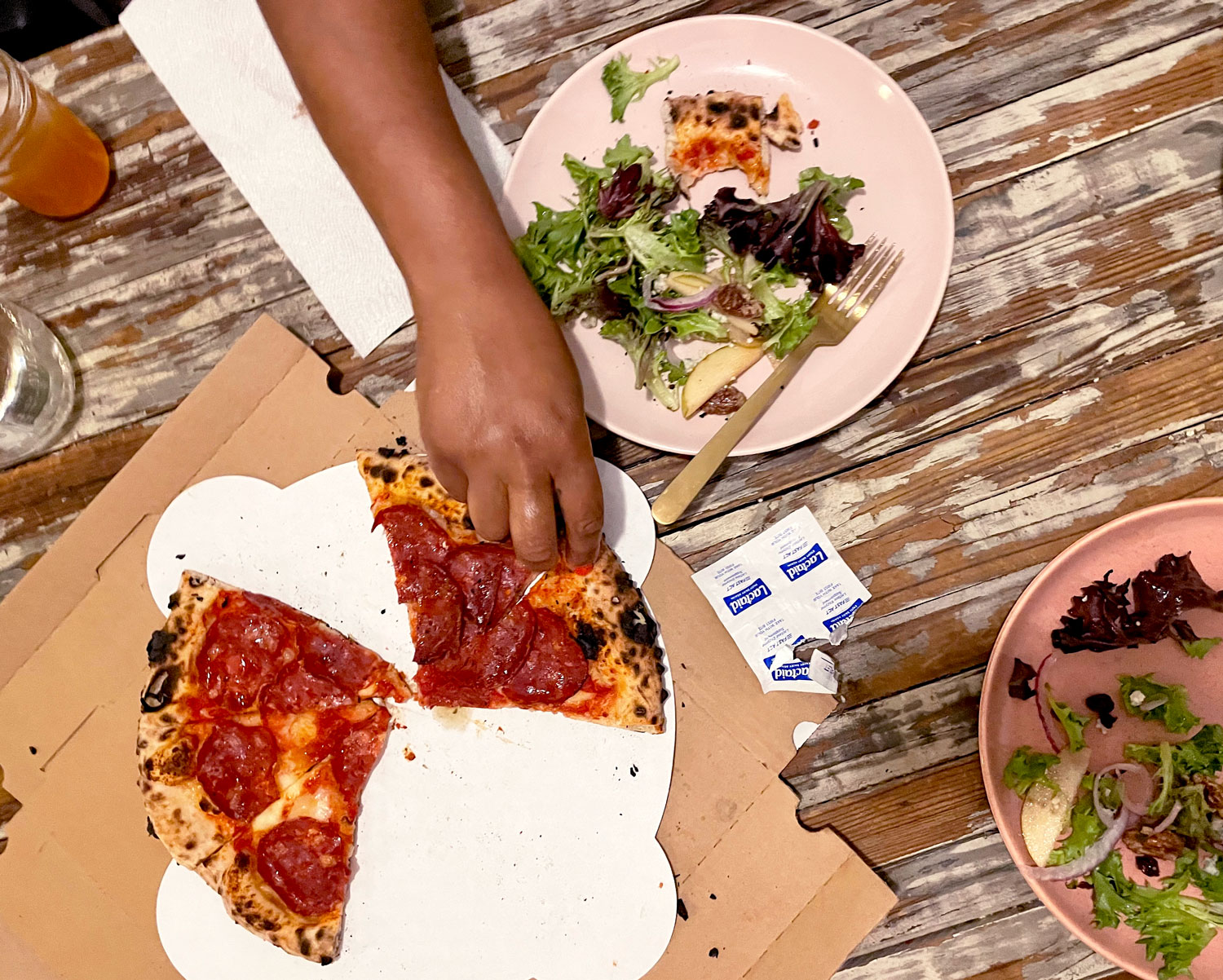As we age, indulgences of the eating and drinking variety increasingly resemble low-stakes games of Russian roulette. Take, for instance, a recent dinner date with my friend Danielle Norris, a Chicago-based sommelier and longtime wine distribution rep who recently found out she’s lactose intolerant.
“You cut the pizza,” Norris said, handing me a pair of kitchen shears then popping a couple of Lactaid with her rum cocktail. I brought the wine, for which I’d taken anticipatory antacid. This was on top of the half-dozen Pepto I’d gulped down over the course of the day for a pesky bout of hormonal diarrhea, which I’d exacerbated by insisting on coffee that morning.
“Check this out: Most Black people are lactose intolerant,” said Norris, who is Black, as we dug into pepperoni pizza and salad dotted with blue cheese. (About three-quarters of Black Americans, in fact, lose the ability to break down the sugar in milk at some point in their lifetimes.) “I thought I dodged that bullet; I thought I was breezy.”
As a wine rep and educator, Norris lives much of her professional life in restaurants (or did so pre-pandemic). In addition to near-daily appearances at restaurants and bars, she attends elaborate client dinners weekly — where she leads tastings or pops by for a drink and a snack to show clients love.
This suits her because she’s infectiously engaging and loves to eat and drink. But starting about two years ago, the indiscriminate indulgences suddenly came with an acutely intolerable price tag — much higher than, say, my generalized complaints of heartburn here, diarrhea there. Hers appeared in the form of pooping three times within 90 minutes of waking up and feeling no relief whatsoever.

“Everyone knows when they’re done pooping, and everyone knows when they’re not,” she said. “You want that feeling of, ‘I can clean my bottom and move on with my day.’ I did not have that. That’s what lactose intolerance is. You don’t have that confidence of, ‘I’m done.’ You’re thinking, ‘How long do I have?'”
She talked to her doctor and began eliminating ingredients; it didn’t take long to determine that the culprit was lactose. For a while, Norris queasily self-rationalized that she preferred the freewheeling approach to living, and she changed little besides slipping Lactaid into her purse before leaving the house. One day, deep into the isolating throes of COVID-era quarantine, something snapped.
“I was standing in the portal between the living and kitchen space in my apartment and dropped something to the floor. I bent over to pick it up, and I broke wind — like an audible, junior-high audiotrack fart,” she said. “Spending more time alone, you recognize what kind of roommate you are to yourself. And the fact that I couldn’t even bend over without farting, I was like, ‘I’m not being a good roommate to myself.’ I didn’t want to live with what my body was putting out anymore.”
She popped up, clapped her hands decisively and announced, “Enough!” to her two cats, Pinky and Walter, who appeared generally supportive.
Norris has never really been a milk drinker — she’s long preferred almond milk in her coffee — but she loves cheese. She’ll tell you she’s Texan and that quesadillas are her favorite snack in the same breath, as if one implies the other. When I asked how she went about phasing out her beloved cheese — anticipating an aspirational missive on gradual elimination — her response floored me. (Though after spending some time with her as you’ve read this story thus far, I’m fairly certain it won’t surprise you.)
“I said goodbye like a lover,” she replied.
She decided to devote an entire weekend to this lovers’ adieu (partly because she knew she’d pay for it physically), and selected two of the most decadent, cheese-rich recipes in her cooking oeuvre. First, she made ramp kimchi grilled cheese with sharp and white-horseradish cheddar on thick sourdough slices, which she smeared liberally with mayonnaise and butter. She ate it standing at the kitchen counter, “and it was the happiest I’ve ever been.”
The weekend crescendoed with Alison Roman’s baked ziti, a veritable dairy fest of fresh ricotta, stringy mozzarella, heavy cream and salty parmesan layered with pasta and garlicky tomato sauce. To complete the scene, Norris poured a generous glass of Montepulciano and queued up “Goodfellas.”

Did she take any preventive Lactaid that weekend? “Hell no! I raw dogged it.”
The more we discussed this over-the-top goodbye, the more her approach reminded me of another joyous sendoff: the New Orleans jazz funeral. In this profound yet exuberant tradition that originated among Black musicians in the Crescent City, mourners salute the passage of a departed soul with a brass-band processional down the street, beginning at the church or funeral home and ending at the cemetery. The music starts off somber but quickly turns celebratory. Passersby are encouraged to join, and everybody dances together in the street — a tangible catharsis for all that commingling joy and pain.
“When the deceased is laid to rest — or they ‘cut the body loose’ — the mourners ‘cut loose’ as well,” wrote Eileen Southern in her 1971 book “The Music of Black Americans.”
Norris proverbially cut dairy loose with a processional of her own, honoring her favorite ingredient in all its licentious finery.
“This was my way of honoring my romance while also saying goodbye,” she said. “I felt affirmed and satisfied. Even undertaking the labor of it, I felt honored. It was something I put a lot of intention into, and I made it my own.”
It was also shrewdly intentional from a personal-health perspective. By making both dishes the pinnacle of richness, Norris sought to recast her cheese cravings along the lines of rare, special-occasion meals like Thanksgiving rather than a convenient snack like a quesadilla.
It’s part of a broader commitment she’s undertaken to listen to her body, which dances to an internal brass band whenever she eats clean, veg-heavy dishes like raw salmon with vegetables over rice. But she refuses to silence or even diminish her inner decadent, which is as much a part of her as her trace Texas accent. Instead, she picks her battles.
“If I have any kind of foresight into my work week, I will eat very minimally and very clean at home and carry Lactaid in my purse,” she said. “If I’m with my homies, I’m going to eat the way I feel best.
“But I also know I am incredibly indulgent as a person. And if I’m electing to be out with people and sharing a meal with them, I want to do it up . . . Did you want the last piece of pizza?”
More by this author:
- My 10-year carbonara journey
- A love letter to all the produce I haven’t picked
- The nourishing joy of simmered whole chicken
- At Bombera, Oakland’s Chicano cooking heritage is the future
- Do not rage-cook mapo tofu, and other emotional kitchen lessons
- Tortilla española, mi cariño: An ode to the simple, perfect Spanish omelet
- Let’s griddle every sandwich, from ham and cheese to peanut butter and honey

